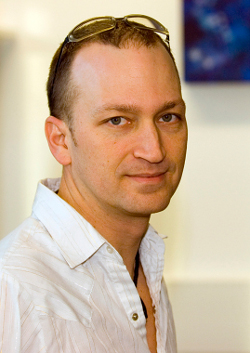Institute scientist to give prestigious Royal Society lecture

Wellcome Trust Sanger Institute Associate Faculty member, Dr Duncan Odom, has been invited by the Royal Society to deliver the prestigious Francis Crick Lecture. Today’s announcement (Monday 22 July) recognises Duncan’s pioneering research in the field of comparative functional genomics. His studies have changed the scientific community’s understanding of how gene activity and its control mechanisms have influenced evolution.
The Francis Crick lecture is awarded each year to celebrate a biological sciences researcher, generally working in the field of genetics, at an early stage in their career.
This will be the fourth time that a member of the Institute will deliver the Francis Crick Lecture. In October 2013 Dr Matt Hurles will speak on his work to improve understanding of inherited disease in adults and children. Joint Faculty member Dr Sarah Teichmann (with EMBL-European Bioinformatics Institute) gave the 2012 lecture on using computational analysis of genomic information to discover the fundamental principles of how genes and proteins interact. The inaugural Francis Crick lecture, in 2003, was given by Associate Faculty member Ewan Birney who spoke on what our genomes tell us about being human.
“I am delighted that the Royal Society has asked me to deliver the Francis Crick Lecture next year. To be recognised by your scientific peers is a great privilege. This honour would not have been possible without the hard work and generosity of the researchers and collaborators with whom I have worked over the years.”
Dr Duncan Odom who leads the Regulatory evolution in mammalian tissue group at the University of Cambridge’s CRUK Cambridge Institute and the Wellcome Trust Sanger Institute
Duncan initially studied chemistry and obtained a PhD in Inorganic Chemistry at Caltech in 2001 before moving into genetics and genomics. During his postdoctoral studies at the Whitehead Institute at MIT, he developed and deployed new methods in gene activity regulation. It was at the Whitehead Institute that he mapped the control of the activity of diabetes-linked genes in liver and pancreatic islets cells by using primary human tissue to show where the regulatory proteins bound to the human genome.
In 2006, he established his research group at the University of Cambridge to focus on understanding how and why different species use the same tissue-specific gene-control mechanisms but for surprisingly different purposes.
Duncan joined the Sanger Institute in 2011 as an Associate Faculty member to pursue new avenues of enquiry by combining his group’s expertise in comparative functional genomics with the intellectual and research strengths of fellow Sanger Institute Faculty. One particular area of interest is how regulation of gene activity affects the development of diseases such as cancer.
“Duncan’s award recognises an innovative and creative researcher whose research pursuits are helping to unlock understanding of the evolution of gene regulation and its implications for disease.”
Professor Sir Mike Stratton Director of the Sanger Institute
More information
Selected websites
Cancer Research UK Cambridge Institute
The Cancer Research UK Cambridge Institute is a major research centre which aims to take the scientific strengths of Cambridge to practical application for the benefit of cancer patients. The Institute is a unique partnership between the University of Cambridge and Cancer Research UK. It is housed in the Li Ka Shing Centre, a state-of-the-art research facility located on the Cambridge Biomedical Campus which was generously funded by Hutchison Whampoa Ltd, Cambridge University, Cancer Research UK, The Atlantic Philanthropies and a range of other donors.
The Royal Society
The Royal Society is a self-governing Fellowship of many of the world’s most distinguished scientists drawn from all areas of science, engineering, and medicine. The Society’s fundamental purpose, as it has been since its foundation in 1660, is to recognise, promote, and support excellence in science and to encourage the development and use of science for the benefit of humanity.
The Society’s strategic priorities emphasise its commitment to the highest quality science, to curiosity-driven research, and to the development and use of science for the benefit of society. These priorities are:
- Promoting science and its benefits
- Recognising excellence in science
- Supporting outstanding science
- Providing scientific advice for policy
- Fostering international and global cooperation
- Education and public engagement
The Wellcome Trust Sanger Institute
The Wellcome Trust Sanger Institute is one of the world’s leading genome centres. Through its ability to conduct research at scale, it is able to engage in bold and long-term exploratory projects that are designed to influence and empower medical science globally. Institute research findings, generated through its own research programmes and through its leading role in international consortia, are being used to develop new diagnostics and treatments for human disease.
The Wellcome Trust
The Wellcome Trust is a global charitable foundation dedicated to achieving extraordinary improvements in human and animal health. We support the brightest minds in biomedical research and the medical humanities. Our breadth of support includes public engagement, education and the application of research to improve health. We are independent of both political and commercial interests.


